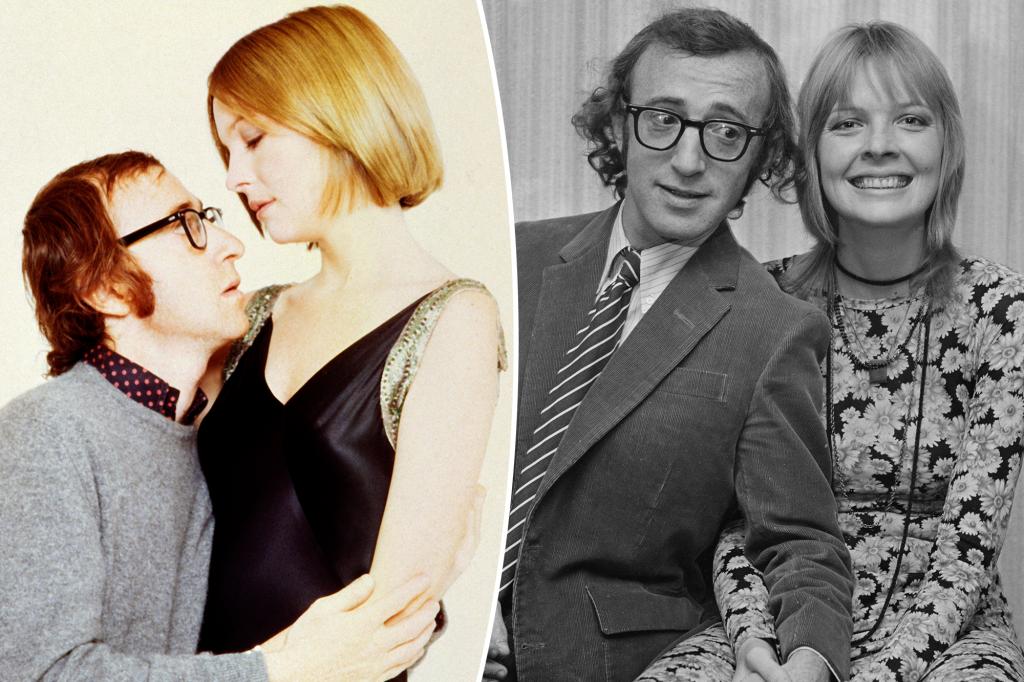Woody Allen paid tribute to ex Diane Keaton days after her sudden death.
In an emotional essay published in the Free Press Sunday, the director recalled co-starring in several films with Keaton, sought her advice throughout her career and spoke about their short-lived relationship.
“Her face and laugh lit up every space she entered, unlike anyone the earth has ever seen or will ever see again,” he wrote, going on to note that their first meeting was when she auditioned for a role in his and David Merrick’s Play It Again, Sam.
“She would come and read for us and knock us both out over and over again,” he recalled.
After she landed the role, Allen and Keaton took a while to warm up to each other, as they were both shy.
“We happened to take breaks at the same time and ended up having a snack together at a store on Eighth Avenue,” Allen said. “That was the first moment we had personal contact, and she was so attractive, so beautiful, so magical that I questioned my own sanity. I thought, ‘How could I fall in love so quickly?'”
After quickly becoming “lovers,” Allen secretly confided in her the script for his first film, “Take the Money and Run.”
The filmmaker said he was prepared for Keaton to tell him the script was a “total failure,” but instead told him that Keaton’s script was “very funny and very original.”
“That success proved her right, and I never doubted her judgment again,” he wrote. “After that, I showed her all the films I made, and I started to only care about her reviews.
“Over time, I started making movies for one audience: Diane Keaton,” he added.
Mr. Allen, 89, said he ignored all reviews of his films and cared only about Keaton’s opinion.
“If she liked it, I considered it an artistic success. If she wasn’t too keen on it, I would use her criticism to re-edit it and create something she thought was better,” he said, at which point the two were living together.
Allen praised Keaton’s many talents, including acting, dancing, singing, photography, book writing, collage making, interior design, and film direction.
“At last, she was someone who made millions of laughs just by being around her,” he said.
While Keaton was shy and reserved, Allen said he was “completely confident in his aesthetic judgment” and “acted on his feelings.”
Allen praised her famous fashion sense, calling her style “a show-stopper.”
“Her tailoring was comparable to Rube Goldberg’s gimmicks,” he wrote, referring to the cartoonist. “She created clothes that defied logic but always worked. In later years, her look became more elegant.”
He also touched on Keaton’s eating disorder, which he discussed in his 2011 memoir.
“We went to a Knicks game and then went to Frankie’s and Johnny’s for steak,” he said. “She’d put away sirloin, hash browns, marble cheesecake, and coffee. Then we’d get home and right away she’d be making waffles and stuffing herself with giant pork tacos. I stood there, dumbfounded.”
They lived together, but it wasn’t until years later that he learned of her struggle with bulimia.
“But when I went through it, all I could think was that no one had ever had a meal like that outside of documentaries about whales,” he joked.
Despite Keaton’s genius sense of art and theater (including an impressive art collection featuring Cy Twombly), Allen described her as a “chick, hump, and hayseed.”
“I should have realized that from the beginning,” he wrote. “The first time I went on a date with her, I looked into her eyes by candlelight and told her how beautiful she was. She stared back and said, ‘Honest Injun?’ Honest Injun? Who would talk like that unless it was an Our Gang comedy? ”
However, he said Keaton ultimately became “an award-winning actress and a sophisticated fashion icon.”
“We had a wonderful few years together in private, and in the end we both moved on. Only God and Freud may understand why we broke up,” he wrote.
Allen, who married his wife Soon-Yi Previn in 1997, said Keaton went on to date several “exciting” men who were “more attractive” than him.
In the conclusion of his essay, the Hollywood writer wrote that Keaton’s death “redefined” the world.
“A few days ago the world was a world that included Diane Keaton, and now it’s a world that doesn’t. So the world is more dire,” he wrote. “And yet her films exist, and her big laugh still echoes in my head.”
Sources claimed that Allen was “very distraught” when he learned that Keaton had died on October 11 in California at the age of 79.
Although Allen and Keaton only dated for a few years, she appeared in a number of his films, including 1977’s Annie Hall, for which she won an Oscar for best actress.
She also appeared in his acclaimed films ‘Sleeper’, ‘Love and Death’, ‘Interior’, etc.
Keaton famously stood by Allen in 2018 after he was repeatedly accused of child sexual abuse.
“Woody Allen is my friend and I continue to believe in him,” Keaton wrote on social media at the time.
The cause of death remains unknown, but Keaton’s health reportedly deteriorated rapidly before his death.

